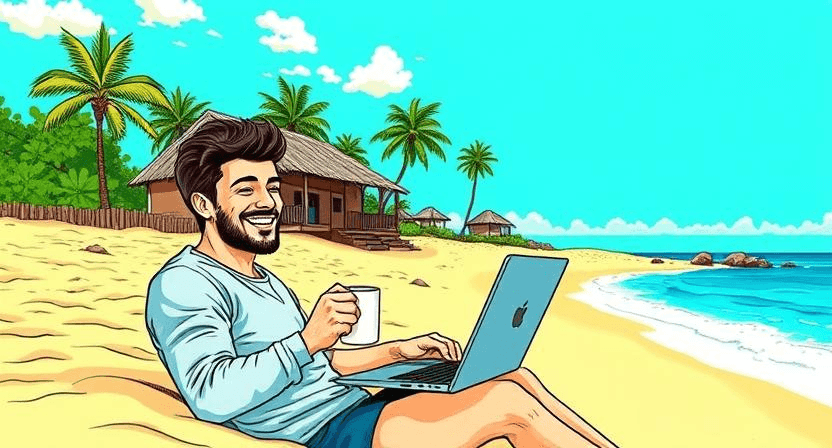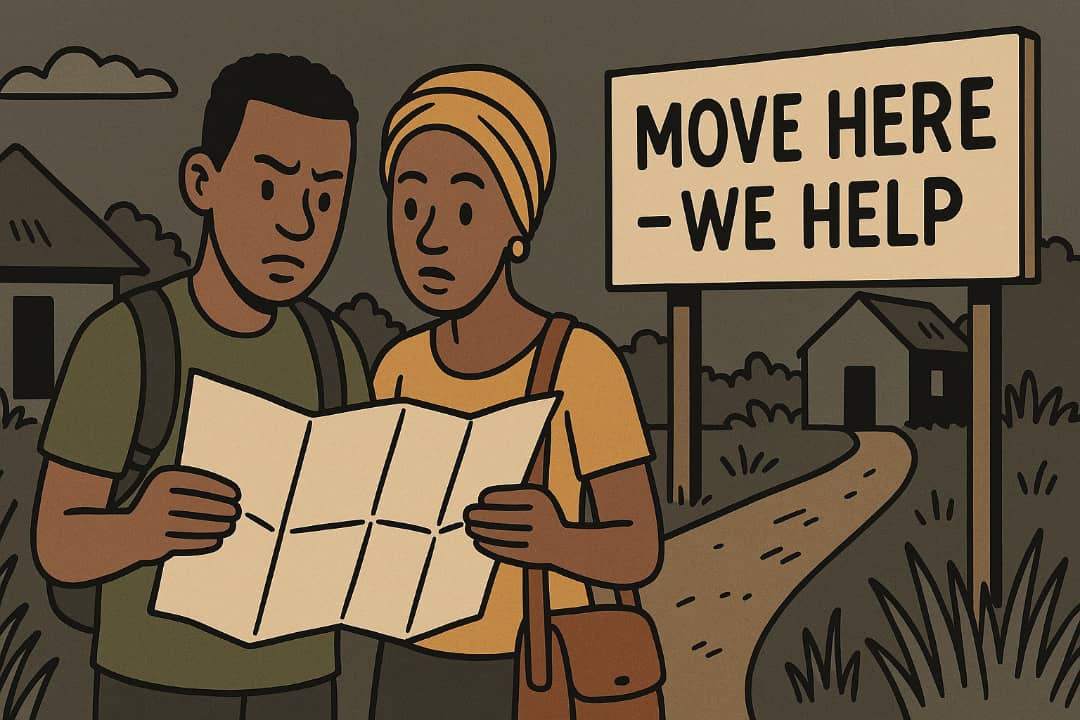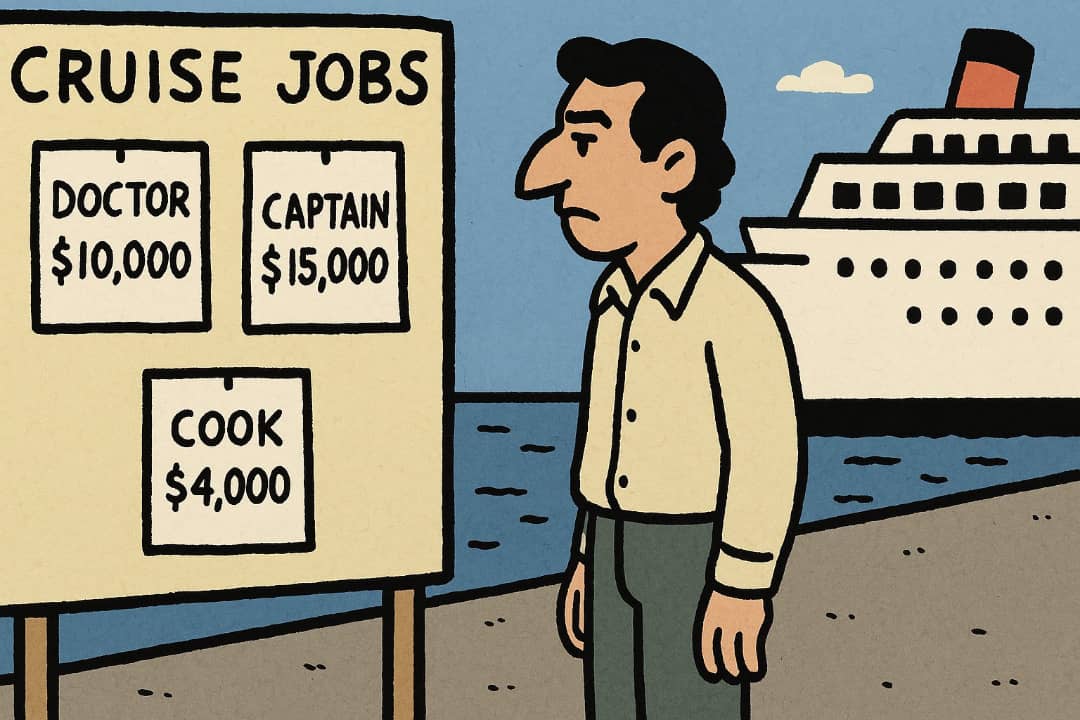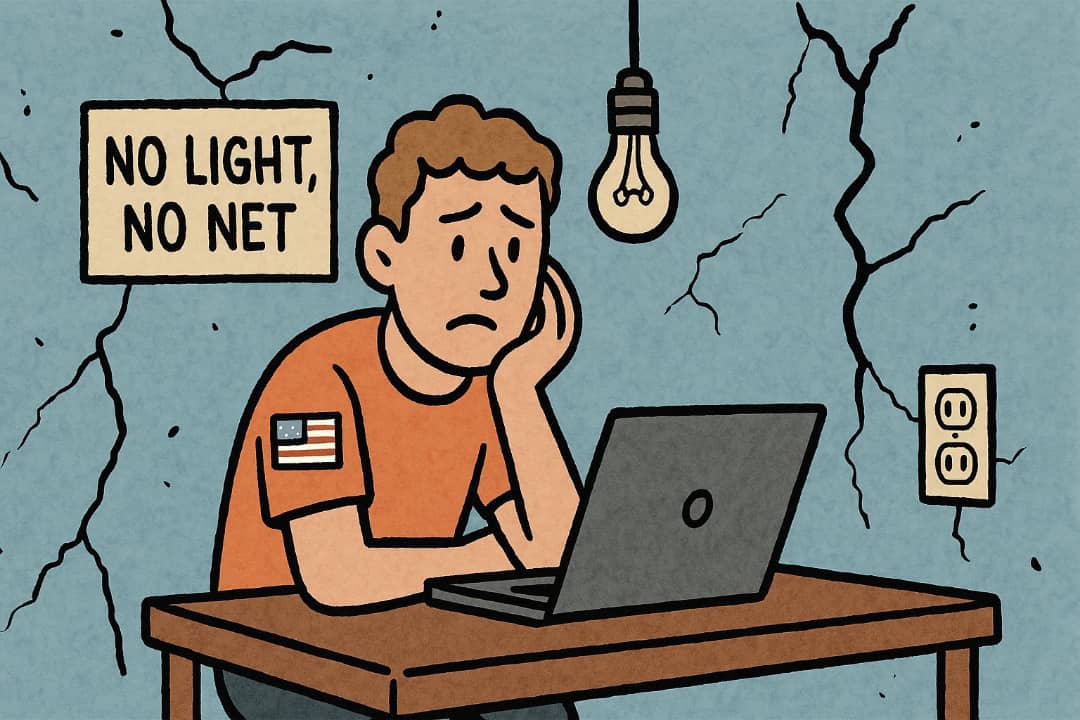Anywhere but Here
Why Tax-Free Visa Loophole in 2025 Could Change Your Life

The Visa Loophole That Lets You Live Tax-Free in 2025 (Hint: It’s Not Dubai)
Let’s just be clear here: you don’t need to be a millionaire, own a yacht, or marry a prince to live tax-free. The governments are rolling out quietly in 2025 these visas that allow you to bring home all of your income—not secret offshore bank accounts, not under-the-table cash. And here’s the catch: it doesn’t cost millions. You simply need to know where. I’m talking about a loophole in the law that enables teachers, freelancers, and even burger flippers to pay no income tax. And no, it’s not Dubai. So let’s get started.
What the Hell Is a “Tax-Free Visa Loophole”?
A “loophole” is an ingenious-but-legitimate means of evading regulations. In this case, it’s a special visa (travel permit) which enables you to live in a country without income tax. Income tax is the money governments steal from your paycheck. The majority of countries tax you if you live there for 6+ months per year. However, some countries—like Albania, Georgia, and Costa Rica—have special visas that enable you to remain tax-free as long as you follow their rules. It’s a “get out of jail free” card for taxes.
Why This Loophole Works (And Why Nobody’s Talking About It)
Governments require your money. But small countries require something else: your skill. They require doctors, programmers, and entrepreneurs to inject life into their economies. So they’ll let you live there for free (tax-free) if you agree to work remotely (from a laptop) or start a business. Albania’s “Digital Nomad Visa,” for example, requires you to earn $2,000/month online. Do that, and you owe 0% income tax. Why? Albania desires your consumer purchasing power, not your salary.
How to Qualify (Even If You’re Broke)
You don’t need a lucrative job. Let’s cut to the chase:
✅ Select the Right Country: Albania, Georgia, Costa Rica, and Paraguay are the best options for 2025. These nations have low living costs (cheap rent/food) and straightforward visa requirements.
✅ Show Your Income: Show that you earn money abroad. If you’re a freelancer, show client bills. If you’re remotely employed, show an employment contract.
✅ Stay Under the Radar: Don’t stay longer than 183 days (6 months) in any country. Otherwise, you’ll owe taxes there.
Example: Maria, a graphic designer from Ohio, moved to Georgia. She works for U.S. clients, pays $300/month for a nice apartment, and she keeps all her $5,000/month income.
The “Double Taxation” Trap (And How to Dodge It)
Double taxation is when two countries tax the same income. If you’re American, the IRS (American government) taxes you no matter where you are. But here’s the catch: use the Foreign Earned Income Exclusion. This is a loophole that lets you avoid U.S. taxes on the first $120,000 you earn abroad.
Example: If you earn $120,000 abroad, and you live in Albania while making $100,000, you pay no taxes to Albania or the U.S.
Why This Isn’t for Rich People (Seriously)
Rich people stash money in Swiss banks. You? You need a passport and Wi-Fi. Albania doesn’t care if you make $2k or $20k/month—they just want you there. The visa fees are low too. Albania is $300/year. Compare that to Dubai’s $15,000 visa.
Step 1: Choose Your Tax-Free Country (2025 Edition)
✅ Albania: 0% income tax, $2k/month income proof, beaches, and $1 coffees.
✅ Georgia: 1% tax for freelancers (essentially free), no minimum income, mountains.
✅ Costa Rica: 0% foreign income tax, $2.5k/month proof, jungles, and monkeys.
🚫 Avoid “tax havens” like Dubai or Monaco. They are expensive and require $100k+ deposits.
Step 2: Obtain the Visa (Without Losing Your Mind)
✅ Collect Documents: Passport, bank statements (to confirm income), and a clean criminal record.
✅ Apply Online: Most countries let you apply on their immigration website.
✅ Wait: Approval takes 2-8 weeks.
✅ Pro tip: Use an immigration lawyer who is local. They cost $200-$500 and work with the forms.
Step 3: Keep Your Tax-Free Status (Forever)
Don’t screw this up:
✅ Renew Your Visa: Most tax-free visas are 1-2 years. Write it down.
✅ Don’t Work Locally: If you get a job in Albania, you’ll have to pay taxes. Keep it remote.
✅ Stay Under 183 Days: If you spend 6+ months in another country (like Italy), you’ll have to pay taxes there.
The One Thing That Will Get You Banned (Don’t Do This)
Bragging. Countries hate front-page headlines like “AMERICANS ABUSE OUR TAX LOOPHOLE.” Keep your trap closed. Pay your $300 visa fee, visit the beaches, and keep your TikTok rants to yourself.
What Happens If You Cheat?
You’ll get deported (booted) and barred. For instance: Jake tried to hide his on-the-books job in Georgia. They found out, revoked his visa, and now he’s stuck in Nebraska.
Real People Doing This Right Now (No BS)
✅ Sarah, 28: English teacher in Costa Rica. Earns $3k/month online. Pays 0 tax.
✅ Raj, 35: Software dev in Albania. Makes $8k/month. Hordes it.
✅ Luis, 42: Retired in Georgia. Lives on $1.5k/month Social Security. Pays 1% tax.
Why 2025 Is Your Last Chance
It won’t work much longer. Governments are beginning to catch on. Portugal has already abandoned its tax-free visa because too many people came to the country. Albania and Georgia won’t be far behind by 2026. The window is closing.
Final Tip: Don’t Be a Greedy Idiot
This loophole is not for spammers. It’s for regular people who want to save their hard-earned cash. Play within the rules, be respectful of the country, and enjoy living like a king on a bartender’s salary.
Anywhere but Here
Help for People Who Want to Move in 2025

Some countries in 2025 are offering money or support for people who want to move and live there. This kind of support is not for tourists or short visits. It is mostly for people who want to live, work, or build businesses in the country. Some of the offers come from governments. Some come from cities or small towns. The goal is to bring more people to live in areas that do not have enough workers or young people.
Italy has some towns that offer money for people who move there. These are usually small towns where many people have left. Some towns will sell houses for one euro. The person who buys the house must fix it within a short time. The buyer must also live in the town. Some towns in southern Italy will pay new residents up to €28,000 over three years if they move in, register their address, and start a small business.
Spain has a similar plan in some villages. A few villages in rural Spain want new families to move in because their population is getting old and small. In some cases, they offer free rent or small grants. These are not direct cash payments. The goal is to help new families settle, send children to local schools, and keep the village active.
Ireland has a plan called the “Our Living Islands” policy. This plan supports people who want to live on small islands around the coast. These islands are often empty or nearly empty during the year. Under this policy, people who renovate old homes on these islands may get grants of up to €84,000. The money is for fixing buildings, not for general use. You must show a plan and get approval before receiving funds.
Japan has a support plan for people who move out of big cities to smaller towns or rural areas. The Japanese government offers up to ¥1 million per person who leaves cities like Tokyo and moves to other towns. The person must live there for some time and take part in the local economy. Some areas offer more support if the person starts a business or joins local farming programs.
Canada has some programs for attracting new immigrants to rural or smaller areas. One program is called the Rural and Northern Immigration Pilot. It does not give free money. But it makes it easier for workers to move into smaller cities in Canada. Some areas offer help like settlement services, job connections, or low-cost housing. These programs help skilled workers who want to live outside big cities like Toronto or Vancouver.
South Korea has programs in place for people who move from cities to rural areas. These programs focus on young families and farmers. The government may offer housing help, business grants, and school support. Some places offer up to 30 million won for new rural homes and another 10 million won for farming equipment. This is mostly for Korean citizens, but some foreign nationals with work permits or long-term residence can apply in specific cases.
Portugal has a digital nomad visa and remote worker support programs. While the visa itself is not payment-based, some local areas offer benefits like tax breaks or rent support to attract remote workers. These are not large payments but can reduce the cost of living.
Germany has start-up support programs in some eastern towns where the population is going down. People who move to start small businesses may get grants or tax relief. These programs are usually for EU citizens, but some non-EU people may qualify with business plans. The offers vary from state to state.
Mauritius has a Premium Visa for long stays and a program to attract skilled workers and remote workers. The country offers tax benefits, fast visa approval, and in some cases, housing guidance. It does not pay directly, but it reduces the cost of relocation.
To get these offers, you need to follow the rules clearly. Each country or city has its own method. You may need to apply for a visa, register your address, show a business plan, or prove your skills. If the offer includes money, it usually comes in parts. You will not get full payment at once. Payments may come monthly or yearly after showing that you live and work there.
Anywhere but Here
Real Cruise Jobs That Pay High Salary

Some cruise ship jobs pay up to $10,000 every month. These jobs are not easy to get, but people who have the right skill and pass the steps can work on a cruise ship and earn this kind of money. The work is inside the ship. The ship moves across countries or continents. You live inside the ship during your contract. Some contracts are six months. Some are longer.
The $10,000 cruise ship jobs are not for all departments. Most jobs on the ship do not pay this much. Only some positions pay from $7,000 to $10,000 per month. These high-pay jobs are mostly for workers with strong qualifications, experience, or special training.
One of the cruise ship jobs that can pay $10,000 per month is the cruise ship doctor. This person takes care of the medical needs of the people on the ship. If someone is sick, the doctor checks them. If someone gets injury, the doctor treats them. Some ships also have a small hospital inside. The cruise doctor must be a licensed medical doctor. The doctor must also have sea survival training. Experience is important. Most cruise lines only employ doctors who have hospital experience or travel medicine knowledge. The cruise doctor can earn from $8,000 to $12,000 monthly depending on the ship and location.
Another high-paying job is the chief engineer. This person controls and monitors the ship engines and all the technical machines on the ship. The chief engineer works with assistant engineers. Their work is to make sure the ship moves well, power runs well, and all machine parts are working. This job needs a license in marine engineering. You also need years of experience in engineering and safety training. This job can pay $9,000 to $11,000 every month.
The hotel director on a cruise ship can also earn $10,000 monthly. The cruise ship has restaurants, bars, lounges, guest rooms, and staff areas. The hotel director manages all these. They make sure passengers enjoy their stay. They control housekeeping, food, events, and customer service. This job needs strong hospitality background. Most hotel directors worked in big hotels before working on ships. Some have degrees in hotel management. The pay depends on the size of the ship and the number of passengers. Some can earn more if there is a bonus or if guests give good ratings.
Another top job is the cruise director. This person plans and runs all entertainment and events on the ship. They work with the musicians, dancers, comedians, and event team. They speak to the guests and announce activities. This person must be bold, friendly, and good with public speaking. Cruise directors often have many years of stage or event experience. They may have worked in resorts or in show business. The salary can be between $7,000 to $10,000 monthly.
There is also the staff captain. This person is second in command after the captain. If the captain is not around, the staff captain takes full control. They supervise crew safety, security, and operations. This job requires a master’s license and many years working on the sea. Most staff captains worked as officers before reaching this level. The salary can be from $8,500 to $11,000 per month.
The cruise ship captain earns the highest pay. This is the most senior person on the ship. They are responsible for the whole ship. They decide when the ship will sail, stop, and handle any emergency. Captains must pass through many levels of training. They start as cadets, then third officer, second officer, chief officer, staff captain, then captain. It can take 10 to 15 years to reach captain level. Captains earn $10,000 to $15,000 every month. Some cruise lines pay more if the captain has long experience.
Some cruise ships have executive chefs who earn over $10,000 monthly. They manage all the kitchens. Some ships have up to ten restaurants. The executive chef writes the menu, buys ingredients, and controls all the cooks. You need culinary school training and many years in 5-star hotels or restaurants. The chef must understand international meals, food safety, and be ready to work long hours.
If you want to apply for cruise ship jobs, you must follow these steps. First, get the right qualification or license for the position. If it is a doctor role, you need a medical degree. If it is an engineering role, you need a marine engineering certificate. If it is a hotel or chef job, you need hospitality or culinary training.
After your qualification, the next step is to check the cruise line websites. Most cruise companies advertise on their site. Some big cruise lines are Royal Caribbean, Carnival, MSC Cruises, Norwegian Cruise Line, and Disney Cruise Line. Look for the job that matches your skill. Read the job requirements carefully.
You will need a Seafarer Medical Certificate. This certificate shows that you are fit to work at sea. A certified marine doctor must check you and issue this certificate. Without it, no cruise company will hire you.
You must also get a STCW Certificate. This is a safety training course required by international law. STCW means Standards of Training, Certification and Watchkeeping. The course includes basic fire safety, sea survival, and emergency response. This training is compulsory for anyone working on a ship.
If you get the job offer, the cruise line will guide you on the next steps. They will tell you about your contract, travel plan, and what to carry. You will need a valid passport and in some cases, a crew visa. For some cruise jobs that pass through the USA, you need a C1/D visa.
Living on a cruise ship is not like living on land. You will work every day. Some shifts are 10 to 12 hours. You will stay in small shared rooms called cabins. Food and accommodation are free. You cannot just go outside unless the ship docks. You must follow the ship rules. But you can save money because you don’t pay rent or buy food. Many workers use cruise jobs to save for school, business, or land.
Some people complain about working long hours. Some say it is hard to be far from family. Others say they enjoy visiting many countries and meeting people from different cultures. Before you apply, understand what the job means. Talk to people who have worked on cruise ships. There are online groups on social media where crew members share their experience. Ask questions and learn.
You must also be careful about fake agents. Many people have lost money to fraud. No genuine cruise line will ask for money before job offer. If someone tells you to pay for job placement, check if they are listed on the cruise line website. You can also contact the cruise line directly to confirm. Real cruise companies do not use WhatsApp to hire.
If you are not qualified for a $10,000 job, you can still start small. Entry-level jobs like housekeeping, waiter, or cleaner pay $700 to $1,200 per month. But if you do well and stay long, you can grow to higher roles. Some people who started as waiters are now restaurant managers on ships.
To grow your chance of success, build experience in hotels, hospitals, or technical areas before applying. Learn basic swimming. Learn how to work in a team. Cruise ships like workers who are serious, polite, and ready to learn.
Cruise ship jobs that pay $10,000 every month are real. But they need strong skill, right training, and good work history. It is not for everyone. But if you have the right background, it can be a good way to earn, grow, and travel.
Anywhere but Here
Free Housing Risks for Digital Nomads

Free housing for digital nomads is a new thing many people now talk about. Some websites, companies, or property owners offer a place to stay without payment. This can look like a good deal. It looks easy. You move to a new country or city, and you live in a house for free while you work online. But the truth is not always like that. There are things many people do not know. These things can bring problems. If you are a digital nomad, you need to know all the details before you agree to free housing.
Most free housing offers come with conditions. These conditions are not always clear at the beginning. Some hosts may say they will give you a room if you help clean the house. Others want you to stay at the property and take care of it. This may include gardening, walking their dogs, or even watching their children. Some property owners ask you to work in their small business in exchange for the room. This is not bad, but if you are not ready for the kind of work, it will not be easy.
Some hosts will say the work is just two hours per day. But when you arrive, the work may take more time. Some digital nomads say they worked five hours or more every day. If your main job is remote work, you may not have time to do it well. This will affect your income. The free housing you got may now cost you your job or your project deadlines. If the host does not respect your time, it will bring stress.
Another problem is the quality of the housing. Some houses are in bad condition. There may be no internet. Or the toilet and kitchen may be broken. Some rooms have no window or fan. If you are working online, you need power and a strong internet connection. If you do not have this, you will not be able to work. Some people use their own money to fix things in the house so they can stay. At the end, the free house becomes expensive.
Location is another important issue. Some free housing is in areas that are far from shops, hospitals, or bus stations. If you need to go out, you may have to pay for transport every day. This adds to your cost. If the place is far from the main town, you may also feel lonely or unsafe. In some places, digital nomads have reported theft or police harassment because they were staying in unknown areas without full documentation.
Immigration rules can also bring trouble. Some countries do not allow visitors to work in exchange for housing without a work visa. If you are caught, you may pay a fine or get banned from that country. Free housing may sound simple, but it can lead to legal issues. Always check the immigration rules of the country. You can also ask the host if they have had digital nomads before and what kind of visa they used. Do not assume it is allowed.
Free housing is sometimes given through websites that connect hosts and nomads. These websites include platforms like Workaway, HelpX, or TrustedHousesitters. They help to connect people. But the websites are not responsible if the agreement goes bad. You are the one who will face the problem. Some users give fake reviews or lie in their profile. You need to ask many questions before you accept any offer.
Some people have good experience with free housing. They stay with friendly hosts. They do light work and have good internet. They use the money they save to travel more. But not everybody has this experience. Some end up spending more money because they fall sick, they lose their work, or they are forced to leave early. These hidden costs are what many people do not expect.
One hidden cost is health. If the room is dirty or the water is not clean, you may fall sick. In a new country, medical care may be expensive. Some digital nomads travel without insurance. When they fall sick, they use all their savings. You should always check if the room is clean and safe. Ask the host for photos or even video calls before you travel. Do not depend on what they write on the platform.
Another cost is emotional stress. If the host is rude or too controlling, you will not feel free. Some digital nomads said they were not allowed to go out, or they were watched all the time. Others were asked to do jobs they did not agree to. Some hosts also expect digital nomads to be friends or join family events. If you say no, they may become angry. This creates pressure. You may feel trapped.
Sometimes, free housing stops being free. Some hosts begin to ask for money after some days. They may say the cost of water or light is too much. Or they ask you to buy your own mattress or furniture. These are not part of the first agreement. But since you are already in the house, it is hard to leave. If you complain, they may ask you to go. You now need to look for a hotel fast. That will cost you even more.
Another thing to think about is safety. If the host is a stranger, you do not know what kind of person they are. There have been reports of harassment and even assault. Some digital nomads say their private things were stolen or searched without permission. You need to protect yourself. Read the reviews carefully. Ask the host to send ID or location details. Share your stay plan with someone you trust.
Some digital nomads try to reduce the risk by choosing hostels that offer part-time work in exchange for free beds. This is common in some tourist areas. But the rules must be clear. Get everything in writing before you arrive. If you are not happy with the deal, leave early. Your peace of mind is more important than free rent.
To stay safe, you can also set up video calls with the host before you agree. Ask them how many hours of work they want per day. Ask them what kind of work. Ask about power, internet, and water. If they do not give straight answers, do not accept the offer. Check if other digital nomads have stayed there before. Search for reviews outside the platform. Use forums or social media to learn from others.
If you are already in the house and you face problems, try to solve them politely. But if the host is too hard, leave. Always keep some emergency money to use in such cases. Do not wait until you are stuck. Also keep your passport and devices close to you. Backup your files in case you need to move fast.
In some countries, there are Facebook groups for digital nomads. These groups help people share safe housing options. You can ask for recommendations. You can also read about bad hosts to avoid. Do not hide your bad experience. Sharing helps others. It also helps to expose those who are not honest.
Free housing is not always bad. But it is not always free. The cost may not be money, but time, energy, safety, or freedom. If you want to try it, go with open eyes. Be ready to ask questions. Do not feel bad if you say no. A bad housing deal can destroy your work and health. Choose what gives you peace.
Digital nomads who do well with free housing take time to plan. They also do not depend on one income. They save extra money before they travel. They also check visa rules and stay in legal places. They ask for simple things like receipts, ID cards, and address. These steps help reduce the risk.
Always read the full profile of the host. Check if the place has reviews from other nomads. Read the bad reviews, not just the good ones. If you see the same complaint many times, it is not by mistake. Ask the host to send a list of what you can and cannot do. If they say no to this, it means they may change the rules after you arrive.
If you want to try free housing, do not let it stop your online work. Always check the internet speed. Ask if there is backup light. Find out if you can have quiet time during the day. These are important if your job needs focus. If these are not available, then the free housing may cost you your income.
In the end, free housing for digital nomads is not always cheap. It comes with hidden things that can cost you more. Always prepare well. Ask many questions. Do not feel shy to say no. Your work, health, and safety are not things to trade for free rent. Choose only what is right for your own life.

 Digital Hustle5 months ago
Digital Hustle5 months agoHow to Make Real Money Online Using Simple Ways

 Money Moves5 months ago
Money Moves5 months agoHow to Avoid Bank Account Problems

 Stay Human5 months ago
Stay Human5 months agoHow to Know If You Are Losing Your Human Side

 Money Moves5 months ago
Money Moves5 months agoSimple Ways to Make Money the Honest Way

 Money Moves5 months ago
Money Moves5 months agoHow to Make Money Without Stress

 Local Genius Spotlight5 months ago
Local Genius Spotlight5 months agoSimple Steps That Made Ian Williams a Leader

 Money Moves5 months ago
Money Moves5 months agoWays Small Business Loan Can Grow Your Work

 Local Genius Spotlight5 months ago
Local Genius Spotlight5 months agoWays Small Entrepreneurs Grow from Nothing

































